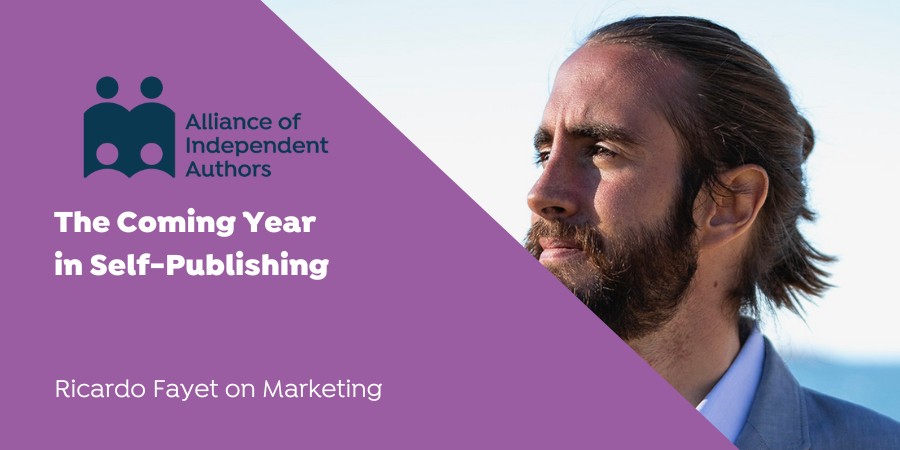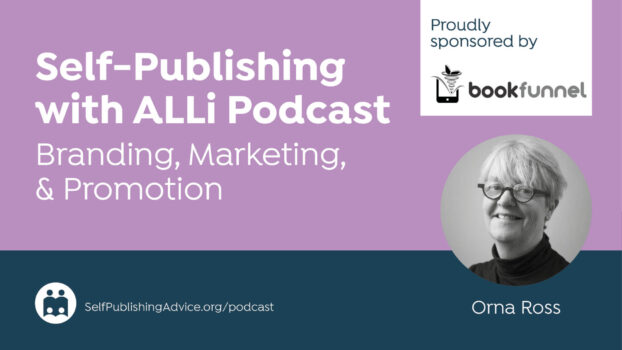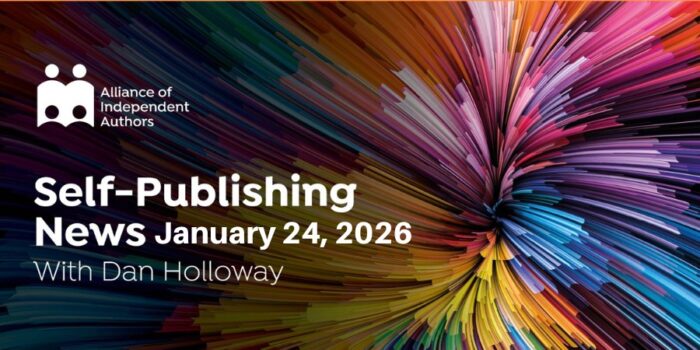Each year, ALLi Campaigns Manager Matty Dalrymple meets with each of our advisers to discuss what they see on the horizon in their advisory area that indie authors should be aware of. In this installment, Matty sits down with Ricardo Fayet, ALLi's marketing adviser, co-founder of author services marketplace Reedsy, and author of How to Market a Book, to explore what’s ahead in book marketing. From leveraging AI as a time-saving tool to making the most of tried-and-true marketing strategies, Fayet shares his insights on what’s working—and what’s not—for indie authors.
Matty: What should ALLi and our members be keeping an eye on with regard to marketing in 2025?

Ricardo Fayet
Fayet: There are a lot of new things when it comes to marketing, obviously with AI. I think of AI as a support in any of your marketing endeavors. If you’re going to do email marketing, you can cut down your workload and help early by leveraging generative AI for that.
If you run a lot of ads, you can use AI for image generation, copy generation, brainstorming, etc. Even for analysis—if you’re not great at analyzing the results of your ads, export a spreadsheet of your Meta ads report, copy-paste it into a generative AI model, and tell it, “Okay, give me an analysis.”
So, AI is basically an assistant or an intern. You can use it for pretty much anything—it’s actually pretty smart. To me, AI doesn’t represent a new marketing opportunity; it just enhances anything you’re already doing marketing-wise.
In terms of new marketing opportunities, what I often say is: The old stuff that we’ve been talking about for years still works. And I know we’re always keen on finding the next big thing, but what I would say is, if you’ve already tried price promotions, Amazon ads, Facebook ads, TikTok, and nothing has worked, the problem might lie more with the book than with the marketing itself.
There’s no secret sauce or secret new thing that’s going to immediately bring in sales. The old stuff—Facebook ads still work. Amazon ads still work. TikTok—you can still get organic visibility. Price promotions are still the best way to get traffic to your book. Kindle Countdown Deals, free promotions, first in series when you’re wide—all that stuff seems kind of old when it comes to marketing advice, but it’s proven, and it works.
So I would recommend trying that stuff first rather than trying to find the next new thing. And if that doesn’t work, then maybe do a reality check on the books, on the series. Are they marketable? Are they commercial? If you manage to sell a good number of copies of book one, but you only have a 30 percent read-through to book two, there’s a problem with book one. No marketing is going to solve that. If you’ve tried everything to sell that first book and it doesn’t work, there’s a problem with the book or its packaging. Ninety-nine percent of the time, the problems lie there. So it might not sound super encouraging or super innovative, but that’s how I see it personally.
A lot of the innovation that I see in marketing, or new ideas and avenues to keep track of, is more for experienced authors. Direct sales, Kickstarters, etc., are great if you have an audience. If you don’t have an audience, selling from your website… no one’s going to find your website. Some people might find your book on Amazon or Apple or Barnes & Noble organically—that can still happen. But finding your website organically? Unless we’re talking nonfiction and you’ve got a great SEO game, that’s never going to happen.
So direct sales—great for authors who already have a following. Kickstarter—great for authors who already have a little bit of a following and a lot of time to invest into that Kickstarter. Direct sales at events—like physical events, going with your books there—it’s great for people who really enjoy that and have a little bit of a brand and a little bit of a following.
That can be really amazing, not so much for selling a bunch of copies but for building a brand. Because that face-to-face meeting is super important. If you manage to sell a book face-to-face, and that person then reads the book and remembers meeting you at the event, and you were nice, they’re going to become a super fan. If they enjoy the book, they’re going to become a super fan. So in-person events, for those kinds of relationships, are amazing.
But if you’re starting out—maybe you’re going to publish your first book, or you have your first book out there, and you’re going to publish your second—if you’re at that level, you need to focus on what’s been working for the past five to ten years in terms of marketing: free or discounted promotions, advertising—Amazon, Facebook, BookBub—email marketing. And TikTok or Instagram Reels. That’s it.
There are a bunch of different types of social media out there, and it’s true that a lot of people are burning out on the older ones. “I’m tired of Facebook” or “I’m tired of Twitter/X, so I’m going to create my own Discord,” for example. I’m seeing some of that, and that’s entirely fine. Or, “I hate Facebook and Meta, so I’m moving to TikTok,” or “I don’t want to be on TikTok, so I’m on Instagram.”
Or, “I don’t like this kind of visual stuff, so I’m on Discord instead.” That’s fine. You can even ignore being on all social media completely. I would still consider social media for advertising. You don’t need to have an organic presence, but if you have an organic presence on Facebook, you probably want a Facebook Ads account to be able to run some ads—at least experiment with them.
So yeah, there’s burnout, but it doesn’t necessarily mean that social media is going away. They’re fragmenting across a bunch of different platforms. One thing is using social media to connect with your readership, with your fan base. That can be done anywhere.
If you tell your fans, “This is a Facebook group. This is a Discord group. This is an online forum that I’ve set up,” all that’s going to work. And then there’s social media where you hope to find new readers. These are platforms where any posts you make need to have augmented organic visibility, meaning they’re not going to be shown only to your existing readers but also to other people—and ideally, as many new people as possible.
For that, there are really only two I would consider: Instagram Reels and TikTok. There are some people doing great work on Pinterest, some people still getting visibility on Facebook, but that’s not the norm. The only social media where you can expect to get some organic visibility—if you put in the work, and that’s a lot of work—are TikTok and Instagram Reels.
The authors I know who are crushing it on social media—meaning they’re using social media as an active marketing channel to find readers—are on either TikTok or Instagram Reels, often both.
Matty: I decided that in 2025, I was going to spend more time and money on places where I knew people were going to buy books, like BookBub ads. I haven’t cracked BookBub ads, but I find them fascinating because they’re more straightforward than Facebook ads. It’s more appealing to me—I feel like I’m better at assessing the results without needing professional help to do it.
And actually, this morning, you were saying earlier about using AI—I had ChatGPT read the BookBub Partners blog post about how to pick author targets. Then I said, “Okay, using the information on that page and any information you can find on Amazon, and excluding any authors who are on Kindle Unlimited, give me six authors that you think would be a good match for my books based on what you know about my books.” And it came back with all new ones, but I thought, “Oh, that’s pretty good.” So I’m just running an experiment to see how that goes.
Fayet: Yeah, that’s a great example of how AI can help an existing marketing channel. I think AI can basically help you save time and make you more effective in your use of any of the existing marketing channels out there.
Matty: Yeah. ALLi encourages AI curiosity, and my message is that the decisions people want to make about using AI for craft, I’ll leave that up to you. But I do think that authors who aren’t using AI for the business side are really putting themselves at a disadvantage. So if you’re going to apply curiosity anywhere, apply it to running your publishing business, not necessarily writing your books.
Fayet: I agree.
Ricardo Fayet is one of the four founders of Reedsy, a marketplace connecting authors to the world’s top publishing talent—from editors to cover designers, book marketers, and literary translators. He’s the author of How to Market a Book: Overperform in a Crowded Market and a regular presenter at several prestigious writers’ conferences: NINC, RWA Australia, and The Self Publishing Show Live, among others.
Matty Dalrymple is the ALLi Campaigns Manager.
Thoughts or further questions on this post or any self-publishing issue?
 If you’re an ALLi member, head over to the SelfPubConnect forum for support from our experienced community of indie authors, advisors, and our own ALLi team. Simply create an account (if you haven’t already) to request to join the forum and get going.
If you’re an ALLi member, head over to the SelfPubConnect forum for support from our experienced community of indie authors, advisors, and our own ALLi team. Simply create an account (if you haven’t already) to request to join the forum and get going.
Non-members looking for more information can search our extensive archive of blog posts and podcast episodes packed with tips and advice at ALLi's Self-Publishing Advice Center.




